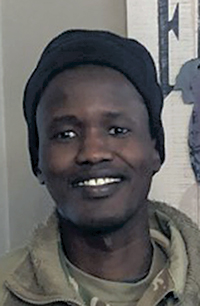The American dream of FourtyTwo
Sudanese native faced danger at almost every turn
-
-Submitted photo
Children walk through the Dadaab Refugee camp. This camp is where FourtyTwo stayed before he came to America in 2013.
-
-Submitted photo
This aerial image shows the Dadaab Refugee camp in Kenya. Fourty-Two spent about half of his life at the camp before coming to America in 2013.
- FourtyTwo Yet

-Submitted photo
Children walk through the Dadaab Refugee camp. This camp is where FourtyTwo stayed before he came to America in 2013.
Editor’s note: This is the first story in a two-part series about the life of FourtyTwo Yet, a Sudanese refugee who defied the odds to find success in the U.S.
Before a man named FourtyTwo ever graced the halls at Iowa Central Community College in Fort Dodge, he survived a perilous journey from Juba to Kenya where along the way Somali soldiers tried to shoot him and wild hyenas tried to attack him.
FourtyTwo Yet was born at a time when a civil war was raging in South Sudan.
“The fighting started in my village,” FourtyTwo told The Messenger via Zoom. “Buildings, properties (destroyed). That was just the first one. The second one was when I was forced to leave.”
His father won his mother’s hand in marriage by hunting and killing a lion. His father’s name was Yet, meaning fingers. Yet was born with six fingers on each hand.

-Submitted photo
This aerial image shows the Dadaab Refugee camp in Kenya. Fourty-Two spent about half of his life at the camp before coming to America in 2013.
Yet, a tribal leader, eventually became a victim of the war.
“That’s how my name was brought up,” FourtyTwo said. “It was the gun that killed my dad.”
FourtyTwo was just a boy, approximately 7 years old, when he said goodbye to his mother. His exact age is unknown.
“It’s (exact age) of no consequence because every day you survive is a good day,” FourtyTwo said. “If you survived the day, you come home, you dance and you eat. You are either a boy or a man or alive or dead.”
To escape the dangers of war, FourtyTwo left with a group of lost boys to seek refuge.

FourtyTwo Yet
“My mom didn’t travel with me because she wanted me to have a good life and go to a refugee village,” FourtyTwo said.
Along the path, FourtyTwo witnessed others around him die of hunger, disease or attacks.
“We were in groups, so they would come and shoot at you,” FourtyTwo said. “Wild animals. Getting lost. Dying of hunger, diseases.”
And if someone strayed from the larger group, their chances of survival were low.
“If you didn’t make it back to the larger group, nobody could survive the wilderness alone,” FourtyTwo said.
When he finally did reach the Dadaab Refugee camp, the struggles weren’t over.
“Getting to the camp wasn’t very easy,” FourtyTwo said. “When we reached the refugee camp, it was actually bad, too.”
FourtyTwo was subjected to discrimination from the Kenyan people.
“They call us devil because we are darker,” FourtyTwo said. “They won’t take our money, they have you put it down first. They didn’t want to touch the unclean Sudanese refugees.”
Brian McClain, who would eventually befriend FourtyTwo in Fort Dodge, said there was a certain level of resentment toward people like FourtyTwo, even though he was in a refugee camp.
“The people of Kenya were already struggling themselves so there was some resentment,” McClain said. “Even though they were getting paid, they felt burdened to help people at a refugee camp. There was this level of irritation to have to help people look for refuge.”
There was no guarantee that FourtyTwo would ever have the opportunity to leave.
He worked to earn little money and was subjected to a rigorous vetting process. A person had to be healthy, learn English and stay out of trouble to be considered.
“Even then in the camp, we still see people dying every day,” FourtyTwo said.
Some of the money earned by FourtyTwo was used to get TV time. And that’s how he learned English.
“We only have one TV in the whole community,” FourtyTwo said. “You had to buy your time to watch TV. Whatever we hear from cartoon we practice.”
Pink Panther, Power Puff Girls and Johnny Bravo were among the cartoons FourtyTwo chose to watch.
Ten years would go by before FourtyTwo received a letter notifying him of whether he was accepted to leave for the U.S.
The acceptance or rejection was often treated as life and death.
“One guy who was rejected, he went to bush and hang himself,” FourtyTwo said. “We had to look for him for a week.”
FourtyTwo gave his letter to a friend to open. The anxiety was almost too much to bear.
“I had to close my eyes waiting for the answer,” he said.
When FourtyTwo learned of his acceptance, there was a period of disbelief.
“When I was told I was coming to U.S., even then I didn’t believe it,” he said. “I had to wait until I got on the plane. When it came, I remember, I don’t even know how to describe it — it was like going to heaven. We had no idea where we were going but we knew it was somewhere really nice. When I landed here, that’s when I celebrated.”
It was in August of 2013 that FourtyTwo landed in Omaha, Nebraska. Later, he moved to Storm Lake. There, he knew a relative that was living there.
For a short time, FourtyTwo worked at a Tyson meat plant while taking some online classes from Iowa Central in Storm Lake. Eventually, he was advised that he may have more of a college experience at the campus in Fort Dodge.
Part two continues in tomorrow’s newspaper.








